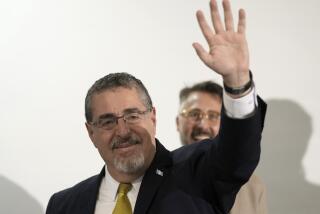In U.S. Address, Argentine Backs Contadora Process : Alfonsin Urges Latin Peace Talks
- Share via
WASHINGTON — Argentine President Raul Alfonsin told Congress on Wednesday that the crisis in Central America must be solved through negotiations, not military pressure, and he warned that without more U.S. economic aid, Latin America’s movement toward democracy will be imperiled.
“There should be specific guarantees that the countries of the region will not meddle in one another’s affairs,” Alfonsin told a joint meeting of the Senate and House of Representatives. “There should be no military installations or mechanisms that threaten the security of any of our countries.”
In a speech at the end of a two-day state visit to Washington, the Argentine gently criticized both the Reagan Administration for its pressure on Nicaragua and the leftist Managua regime for its support of revolutions elsewhere--without mentioning either by name.
“My government supports the efforts of Contadora, which is the appropriate mechanism for finding stable solutions for the Central American countries,” he said. The Contadora Group, consisting of Mexico, Panama, Colombia and Venezuela, has been seeking a negotiated settlement for Central America’s conflicts.
State Department officials said they were pleased with the speech, because it did not directly conflict with U.S. policy in the region.
Argentine officials said, however, that Alfonsin disagreed more pointedly with President Reagan on the issue of Nicaragua during the two presidents’ meeting on Tuesday and urged a reduced U.S. military presence in the region.
State Department officials said Reagan surprised the Argentines in his welcoming speech on Tuesday by departing from his advance text to add a jab at “the Communist tyranny imposed on Nicaragua” and a plea to Congress for renewed aid to the rebels fighting the regime. Reagan then tried to persuade the Argentine of his case, they said, but ran into a politely noncommittal response.
Asked about the issue Wednesday, Alfonsin told reporters: “We have talked about this topic, referring to the principle of international law in Latin America of nonintervention. But we also take into consideration the reality of the security of the United States.”
Ended Contra Support
Before its rightist military regime left office in 1983, Argentina funded and organized the rebels who are fighting Nicaragua’s Sandinista government. But one of Alfonsin’s first acts as Argentina’s democratically elected president was to end the program, an action that led the U.S. Central Intelligence Agency to assume a direct role in sponsoring the rebels.
Alfonsin’s main thrust in his two-day visit to Washington was a plea for help in reviving his country’s sick economy. He reaffirmed Argentina’s promise to honor its huge foreign debt and said he won “new understanding” of its economic problems from the United States and the International Monetary Fund in return.
“There is hope in the continuing tendency toward democracy in Latin America,” Alfonsin told Congress. “An eventual failure of the new democracies of Latin America . . . will have grave consequences for the region, including the United States. That is why I request a special understanding.”
Argentina is laboring under a $48-billion foreign debt and an inflation rate that Alfonsin has brought down to 800%. The International Monetary Fund has helped obtain new loans for the government but has demanded cuts in the population’s standard of living--cuts that Alfonsin warned could cause dangerous social instability.
Alfonsin met with IMF Managing Director Jacques de Larosiere on Wednesday and said he found “a new understanding of Argentina’s problems.”
He also appealed to the United States and European countries to open their markets to imports from Argentina.
“We have opened our markets, but this has not been reciprocated by the countries of the north,” he said. “If you want to talk about aid, there is more Argentine capital coming to the United States than American aid coming to Argentina. In other words, we are aiding you, and we cannot continue that.”
Alfonsin also complained that British Prime Minister Margaret Thatcher’s “intransigence” is blocking Argentine efforts to negotiate a settlement of the Falkland Islands dispute that caused the two nations’ 1982 war.
“I get the impression that Mrs. Thatcher does not understand the difference between dictatorship and democracy,” he said, suggesting that Britain should be more flexible with his regime than with the military government. “I believe the United States could make her understand.”
Alfonsin will visit New York, Chicago and Houston before leaving for Buenos Aires on Sunday.
More to Read
Sign up for Essential California
The most important California stories and recommendations in your inbox every morning.
You may occasionally receive promotional content from the Los Angeles Times.














